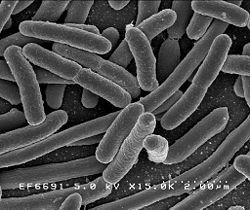by
Joan Trombetti, Writer | February 19, 2008

E. coli, like MRSA, may
become antibiotic resistant
Scientists are warning of the increasing threat from infections caused by antibiotic-resistant Escherichia coli (E. coli) bacteria.
As they spread beyond hospitals into the community, such bugs will become as big a threat as Methicillin-resistant Staphylococcus aureus (MRSA); MRSA is a drug-resistant form of the common infection Staphyolococcus aureus, and is responsible for hundreds of deaths each year.
It appears that previously healthy patients who have not been in hospital have been found to be infected with a drug-resistant form of the E. coli bug.
Cases of community-acquired MRSA, in which healthy people have contracted the superbug without having been in hospital have grown alarmingly and the researchers say extra funding is needed to track the worldwide spread of resistant forms of E. coli in hospitals and the community.
Antibiotic-resistant E. coli are spreading in hospitals and into the wider community and such strains are responsible for the rise in dangerous bloodstream infections. The researchers say such infections were probably initially brought into hospitals from the community as E. coli is a common bacteria found in the human gut which is normally harmless.
However some strains including the potentially lethal E. coli O157:H7 have been linked to several food poisoning outbreaks and can cause sickness in humans including urine and gut infections, as well as blood poisoning.
Scientists Dr. Johann Pitout and Dr. Kevin Laupland from the University of Calgary in Canada studied a strain of E. coli that produces enzymes which give it a resistance to antibiotic drugs.
Their report warns that while the infections are currently rare, it is possible that in the near future doctors will be regularly confronted with hospital types of bacteria causing infections in patients from the community.
This scenario is very similar to that of community-acquired MRSA.
The scientists say though the bacteria are not currently considered to be excessively virulent, but are becoming more resistant to antibiotics and therefore harder to treat.
They believe that in future doctors will have to decide whether to use antibiotics to treat some illnesses at the risk of promoting the rise of resistant strains and possibly accept that some minor infections should be treated without antibiotics.
It is thought that though better detection of the "superstrains" would aid treatment, it would be unlikely to halt the spread of resistant bacteria, because this is being driven by antibiotic use more generally.
Back to HCB News
